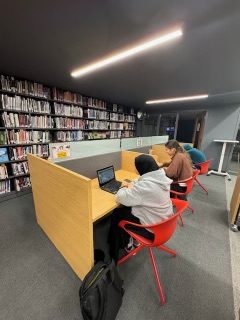After a long winter break and a second mini break due to snowstorms and Chicago’s cruel temperatures, school is fully back in session. The second semester may feel like a drag with only a few months until freedom— especially for those battling senioritis (the deadliest disease characterized by a lack of motivation and enthusiasm as graduation looms on the horizon)- but it’s important to keep up with academics. Each class requires different methods for studying or getting through homework and each method will work differently for students. However, with the right mindset and strategies, battling the second-semester blues won’t be as draining.
Beginning the semester by establishing clear and achievable goals allows for a greater chance for long term success. Breaking down larger tasks into smaller, manageable steps can make workload seem less overwhelming, as well as developing a realistic and structured schedule that includes dedicated study time, breaks and other activities that need to be done.
“I always try to take advantage of the study halls that I have throughout the day. Although the periods are only 42 minutes, the time adds up throughout the day. When I get home, I try to complete my homework while I’m still in the “school” mindset,” senior Camden Buduan said.
Sticking to a schedule as much as possible helps establish a sense of consistency. Alongside a well-organized routine that can improve time management and reduce stress, staying engaged in classes can be a huge help. It’s tempting to mentally check out during the second semester, however maintaining active participation in class discussions and asking questions can enhance critical thinking skills and allows for easier understanding and memorization.
A little silly, but color-coordinating accessories or organizing study supplies may make things more fun and (in ways) easier.
Staying healthy is a given, of course. Physical and mental well-being are crucial during the final semester. While it may seem hard to balance enough sleep, a nutritious diet, incorporating regular exercise, maintaining academics and having a social life, having bits and pieces of each “section” can help build habits, and ultimately a healthier life in the long term.
“I found that studying with friends is one way to make homework feel less monotonous and motivates me to finish my assignments,” Buduan said.
If a study space seems dull, or is impacting the ability to concentrate, move around! Changing a room, the lighting, or even going to a completely different space can help.
“I try to do a little each day, so that way it doesn’t pile up in the end. Also, definitely using study halls as periods to get stuff done. I love to-do lists because they help me feel accomplished and organized, especially if I’m overwhelmed,” senior Abigail Lopez said.
Others opt to use other resources, such as the library.
“I usually go to the library to focus up. The environment is quiet with limited distractions and you can go with your friends if you want. I usually turn my phone on do not disturb, listen to my music, and start going at it,” senior Annette Park said.
Forming study groups can help by holding one another accountable, however it is important to note whether or not a student works and studies better alone or with a group. Being honest and figuring out what works best is always a good option, just as seeking support is.
“My mentality usually is ‘the faster or sooner you get it done, the more free time and the better you’ll feel later,’— better to suffer for a bit rather than staying up late and suffering for the whole next day,” Park said.
Don’t hesitate to reach out for support from teachers, friends, or family members. Discussing concerns, sharing goals, or seeking specific advice when needed can provide encouragement during challenging times.
“Being with friends has helped me to stay motivated to continue to try in school,” Park said.
Of course, celebrating achievements is a great way to measure how far a student has progressed, no matter how small. Recognizing progress can boost confidence and motivation; consider creating a list of milestones throughout the semester with rewards when they have been reached.
“Having something to look forward to, whether it’s making a future plan with my friends, a sport coming up, or any other extracurricular. Keep busy and take it one day at a time,” Lopez said.
It’s okay to feel a mix of emotions. For a lot of seniors, embracing the changes that lie ahead can seem terrifying; and maybe it’s supposed to be. Growth is uncomfortable, and yet it is an opportunity to learn from new experiences. Senioritis will not ever have a single cure for every person, but the finish line is in sight, so have fun, try something new, and enjoy whatever few months there are left.








